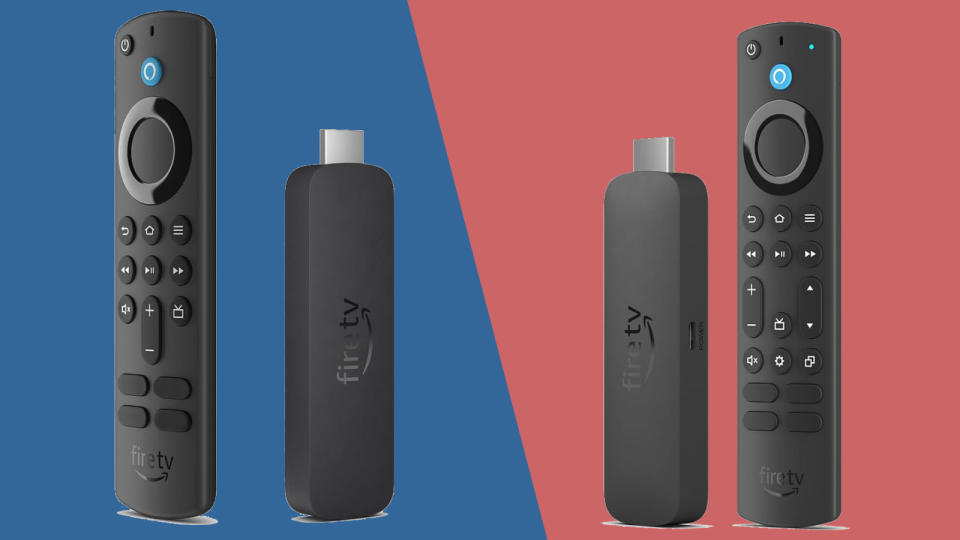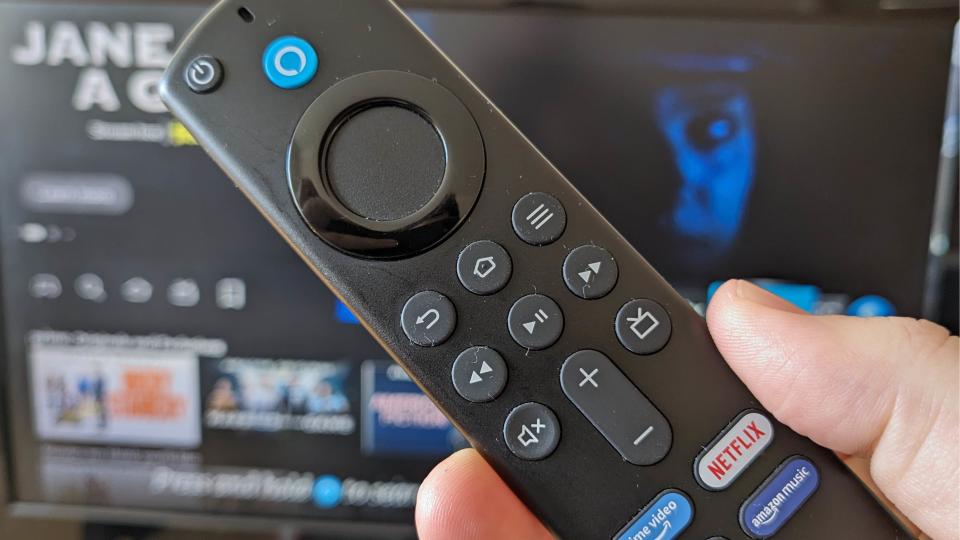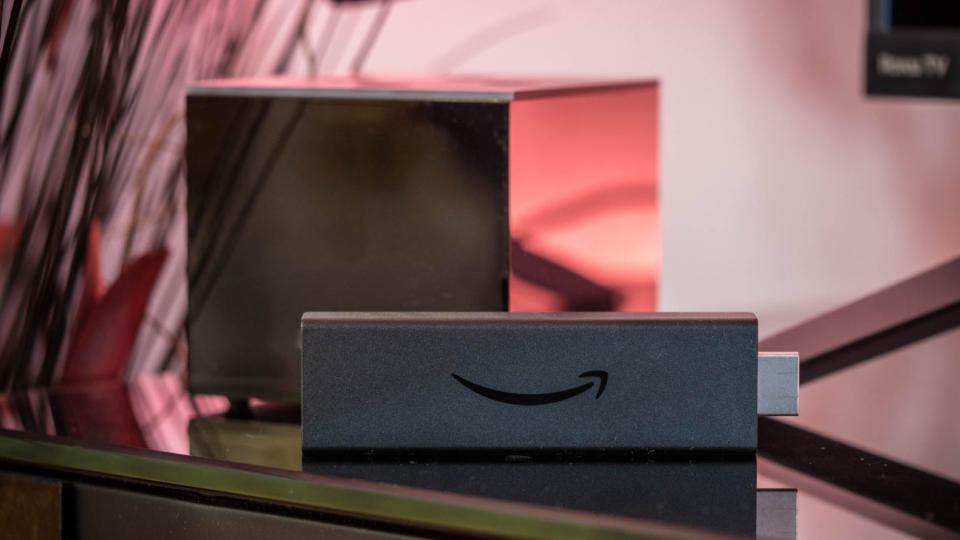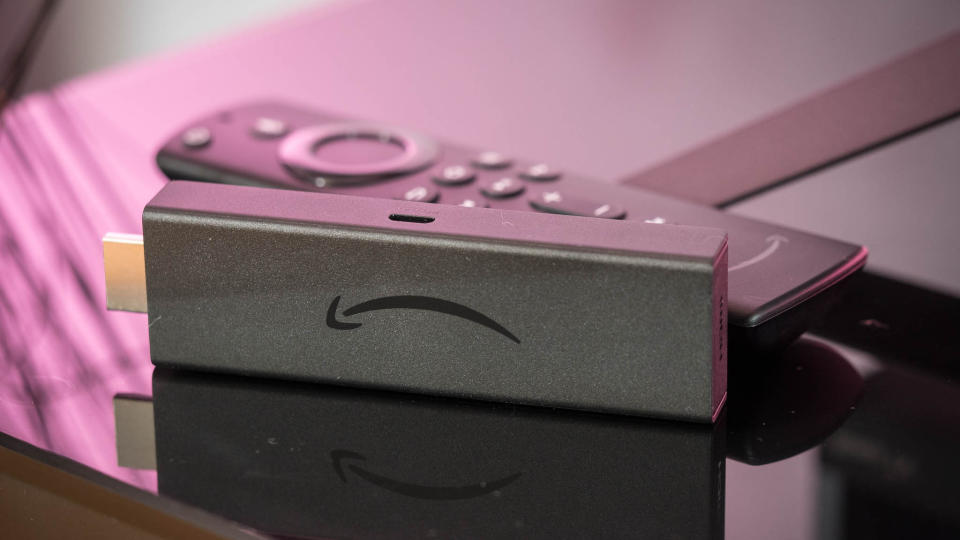Amazon Fire TV Stick 4K vs Fire Stick 4K Max: comparing two high-res streaming sticks
When you buy through links on our articles, Future and its syndication partners may earn a commission.

Editor's note: at the time of writing it's Amazon Prime Day (Tuesday, July 16 and Wednesday, July 17) and that means if you're looking to buy an Amazon Fire TV Stick 4K or Fire TV Stick 4K Max, you'll be able to find a good discount on them.
These and Amazon's other Fire TV streaming device are all seeing pretty good discounts, with the Fire TV Stick 4K in the US and TV Stick 4K Max in the UK seeing particularly impressive price cuts.
These will only last a few days, so act fast if you're on the market for a new 4K-enabled Fire TV Stick. Here are all the Amazon discounts, if you're interesting in checking out the market:
US discounts
UK discounts
Fans of 4K streaming who want to buy the best Amazon Fire stick for their needs will be spoiled for choice, as over half of Amazon's range supports video output at Ultra-High Definition or UHD.
While many who have a 4K TV or projector might immediately opt for the Amazon Fire TV Stick 4K, due to it having '4K' in the name, that's not your only option. Its closest rival is the Amazon Fire TV Stick 4K Max, which is a similar device but with a few key upgrades.
So what's the difference between the Amazon Fire TV Stick 4K and the Fire TV Stick 4K Max? We'll walk you through the differences so you can make a buying decision and pick the best streaming stick for you.
Amazon Fire TV Stick 4K vs Fire TV Stick 4K Max: price
Neither the Amazon Fire TV Stick 4K or the Fire TV Stick 4K Max are what we'd consider budget streaming sticks. Of the five such devices Amazon offers, they're the third- and second-most pricey respectively.
The Amazon Fire TV Stick 4K costs $49.99 / £59.99 to buy, while the Fire TV Stick 4K Max is a little pricier at $59.99 / £69.99. With just $10 / £10 between them, you're not exactly breaking the bank by stretching to the Max model, but not everyone will consider the upgrade necessary.
It's worth pointing out that both of these products (and most Amazon gadgets, for that matter) often see price cuts. These are most common around Black Friday in late November and the various Prime Days, but can crop up at many other times too. You can easily save $20 / £15 if you don't need the streaming stick urgently.
Amazon Fire TV Stick 4K vs Fire TV Stick 4K Max: design

The biggest design difference between the Amazon Fire TV Stick 4K and 4K Max is in the remote department: they're not exactly the same. The former has the standard Alexa Voice Remote that the standard Amazon Fire TV Stick has, while the 4K Max has what's called the Alexa Voice Remote Enhanced.
The Alexa Voice Remotes are generally similar: they have all the general navigation features, TV controls, an Alexa button for voice commands and four preset app buttons (that vary by region).
The Enhanced is... well, enhanced by some extra buttons. There are extra options that give you extra control over live TV viewing, and there's also a new settings button. Both remotes take 2 AAA batteries to work.
When it comes to the streaming stick itself, there are no design differences to speak of: they're small dongles that plug into a TV, projector or monitor's HDMI-slot and also require power via a mains plug into a micro-USB port.
Amazon Fire TV Stick 4K vs Fire TV Stick 4K Max: what it's like to use

The interface of both the Amazon Fire TV Stick 4K and Fire TV Stick 4K Max are the same: they both use Amazon's Fire TV operating system. This gets you easy access to all the apps you'll want to stream from as well as live TV and a select few non-video apps like Prime Music. The devices also both support Picture-in-Picture, so you can watch videos while still doing other things on the stick, which Amazon's cheaper devices don't offer.
A few slight differences give the Max the edge though. While both sticks have 2GB RAM for navigation, so they'll feel equally fast to use, there are storage differences: the 4K has 8GB ROM for storage but the 4K Max has double that at 16GB. This means you can host many more apps, downloads and extras without running out of space.
The Fire TV Stick 4K Max also supports Wi-Fi 6E connectivity while the 4K is only on Wi-Fi 6, with the 6E offering a little more speed and reliability if you have a router that supports it.
The main selling point of the Fire TV Stick 4K Max over its non-Max sibling is a feature called Fire TV Ambient Experience, which gives your TV an extra Alexa makeover when you're not watching videos. When your TV is in standby it lets you display artwork of your choice (including your own pictures, an online gallery or even AI art), look at widgets including weather, calendars, to-do lists and more, and set up various reminders and functions using Alexa's scheduling tools.
Fire TV Ambient Experience effectively turns your TV into an Alexa-enabled smart home assisstant, akin to the Echo range of products except a lot bigger. Plus, it means your TV isn't a big black void on your wall when not in use, but brightens up your room.
Amazon Fire TV Stick 4K vs Fire TV Stick 4K Max: video and audio quality

Now for a much shorter section: both the Amazon Fire TV Stick 4K and its Max counterpart offer exactly the same video and audio capabilities.
Both support video playback at up to 4K or Ultra HD, and video standards including Dolby Vision, HDR, HDR10+ and HLG. This all requires a TV, projector or monitor that supports them too.
When it comes to audio, both support Dobly Atmos Audio which is basically an imitation surround-sound tech for immersive audio.
Amazon Fire TV Stick 4K vs Fire TV Stick 4K Max: overview
Specifications comparison
Verdict
The Amazon Fire TV Stick 4K and 4K Max are two very similar streaming sticks, and if you're just looking for any way to stream 4K video from your TV set, then you'll find the standard 4K is better value for money.
The 4K Max is for people who are fully on-board the Alexa train, because Fire TV Ambient Experience is its big extra feature that you're paying for. Not only does it transform the way you use your TV (making it a part of a room even when not actively in use), but it gives you handy extra ways to use the Amazon smart assistant Alexa... as long as you think you'll actually use these features. If you're not a smart assisstant fan, then the Max isn't necessary.
Many of the extra features aren't terrible necessary: 16GB storage is more than most people will ever need and the enhanced remote won't change your navigation experience that much.

 Yahoo News
Yahoo News 
